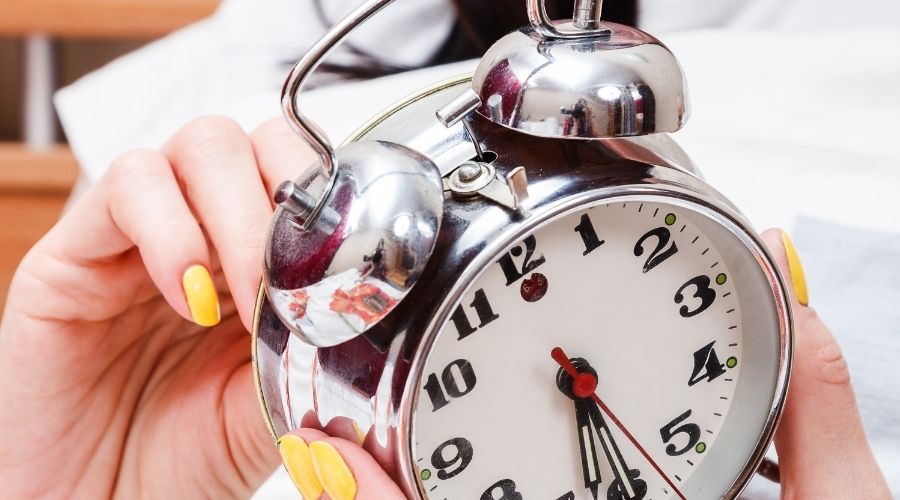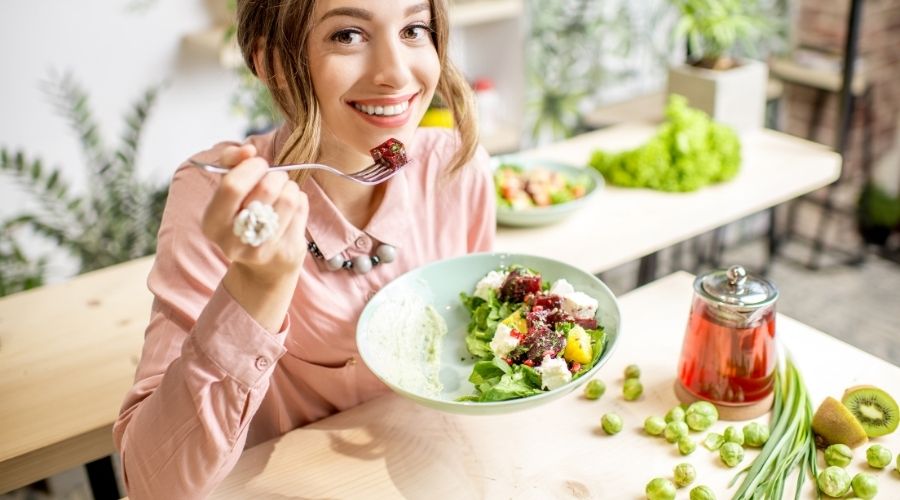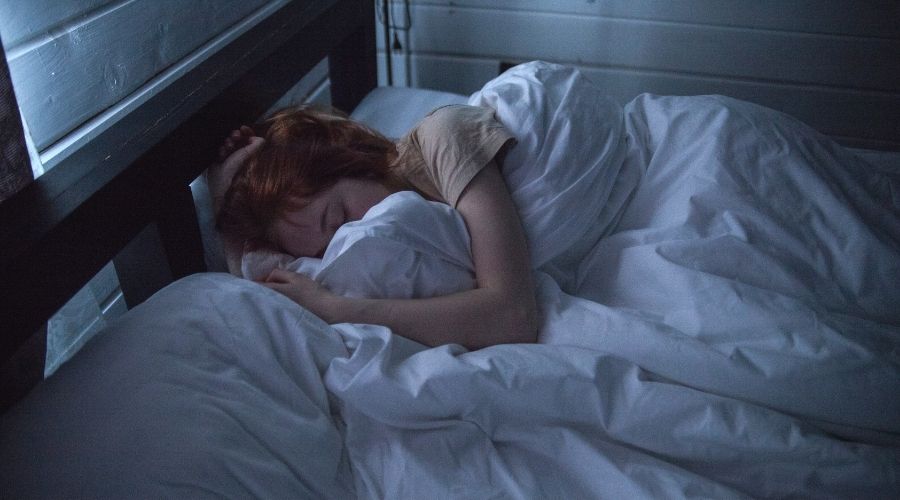A good night’s sleep has become a valuable commodity in a world of constant stimulation and demanding schedules. The key to unlocking this treasure lies in the establishment of a consistent and effective bedtime routine. Whether you have been struggling with restless nights or simply want to optimise your sleep quality, this blog is your guide to discovering the best ways to create a bedtime routine that will leave you feeling refreshed, revived, and ready to conquer each day.
Join us as we explore the science behind sleep, delve into the habits that can make or break your nighttime rituals, and offer practical tips and techniques to help you establish a bedtime routine that truly works wonders for your sleep quality. Say goodbye to tossing and turning and hello to a restful night’s sleep like never before!
1. Set Your Alarm

Using an alarm to go to bed rather than waking up might seem a bit strange, but it’s a clever way to boost the quality of your sleep. Even grown-ups need a regular bedtime for better rest. With all the binge-watching and late-night activities, it’s easy to lose track of time. That’s where a bedtime alarm comes in handy—it gently reminds you that it’s time to start winding down for the night. But here’s the trick: when the alarm rings, don’t rush straight to bed. Instead, give yourself some time for a calming bedtime routine. This period is a chance to do things like read a book, relax your mind, and set the stage for a cosy night’s sleep.
When you set a bedtime alarm, you are actually training your body and mind to understand how important sleep is and to stick to a regular sleep schedule. This helps your body’s internal clock stay in sync, making it easier to fall asleep and wake up feeling refreshed. So, it’s not about the time you wake up; it’s about creating a soothing bedtime routine that helps you slide into a peaceful slumber, setting you up for a more restful and revitalising night’s sleep.
2. Put Away Electronic Devices Before Bed

Establishing a bedtime routine that helps you sleep better is super important, and one smart move is to keep electronic gadgets away before going to bed. You may feel relaxed while watching your favourite television shows or just simply scrolling social media over electronic devices such as smartphones, computers, televisions, laptops, and tablets, but they radiate blue light from the screens. WHO research also proves that sleep quality degrades when using electronic devices during sleep time. It’s a kind of light that impacts the production of melatonin (a sleep-inducing hormone) in the body. So, it keeps you awake. The trick here is to make it a habit to stash those gadgets at the start of your bedtime routine. And if you can, try not to use them much in the evening. If you can’t resist checking your phone, set it to red-light mode before you start your bedtime routine. This way, it won’t mess up your sleep as much.
So, in simpler terms, when you put your electronic gadgets away before bed, you are helping your body get ready for a good night’s sleep. It’s like telling your brain, “Hey, it’s time to wind down.” This is a game-changer because better sleep means you will feel happier, more focused, and more energised during the day. It’s a small change that makes a big difference in your life. Just remember to create a digital-free zone in your bedtime routine, and if you must use your phone, make sure it’s in red-light mode to avoid sleep disturbance.
3. Eat Light And Healthy Before Bed

When it comes to creating a bedtime routine that promotes better sleep, your food choices play a crucial role. Eating light and healthy before going to bed can make a big difference. Heavy and rich meals, especially those loaded with fats and spices, can lead to discomfort, indigestion, and heartburn. These uncomfortable feelings not only make it hard to fall asleep but can also interrupt your sleep throughout the night. On the other hand, choosing a well-balanced, lighter meal before bedtime provides your body with the nutrients it needs for a peaceful night’s sleep without overloading your digestive system.
Timing matters too. Having a big or spicy meal right before bedtime can speed up your metabolism, making it tough for your body to wind down for sleep. In contrast, a sensible, healthy snack before bed can help keep your blood sugar steady and prevent those midnight hunger pangs. So, by making healthy food choices in the evening and leaving some time between your last meal and bedtime, you can greatly improve your sleep quality, ensuring you wake up feeling refreshed and ready for the day.
4. Make A To-Do List For Tomorrow

Creating a to-do list for tomorrow is a great way to improve your bedtime routine and get better sleep. If you ever feel overwhelmed with thoughts and worries at night, making a simple to-do list can really help. Research has shown that spending just five minutes before bed to write down what you need to do the next day can help you fall asleep faster. It stops you from constantly thinking about all the things you have to do while you’re trying to sleep. Using a paper list is better because it keeps your mind from racing and makes you feel more in control of the next day even before it begins.
Making a to-do list is a smart choice because there’s only so much you can do to get ready for the next day. This practice not only helps you fall asleep faster but also makes you feel more organised and ready for the day ahead. In just a few minutes, you can plan your to-do list, which reduces anxiety and sets a clear plan for the next day. By putting your tasks on paper, you clear your mind and let it know that everything is noted and can be tackled tomorrow. So, making a simple to-do list can be a bedtime habit that calms your mind, makes your sleep better, and makes you feel more in charge of the day ahead.
5. Dim The Lights In Your Bedroom

Turning down the lights in your bedroom is a top-notch bedtime trick to make your sleep much better. This works because our bodies follow a sort of natural schedule guided by light, called the circadian rhythm. When it gets dark, our bodies get a signal that it’s time to rest. So, by dimming the lights in your bedroom when it’s close to bedtime, you are telling your body that it’s time to relax and get ready for sleep. This change from bright lights to softer, gentle lighting helps your body release a sleepy hormone called melatonin, making it easier to fall asleep and enjoy a more refreshed morning.
In addition, dimming the lights in your bedroom generates a pleasant and peaceful atmosphere. Bright lights can keep your brain active, making it hard to unwind after a long day. But softer, warm lighting sets a relaxing mood and makes you feel snug. The fading light signals your body that it is time for sleep, which helps you maintain a regular sleep schedule. This also benefits you by helping you create a nighttime habit. To put it briefly, dimming the lights in your bedroom is a simple but super effective way to create a calming sleep environment and make your sleep quality so much better.
6. Doing Meditation

Adding meditation to your nightly routine can be a real sleep booster. It’s like a magic trick to help your body and mind relax. One type of meditation, called mindfulness meditation, is especially great for unwinding and letting go of all the stress from the day. When you practise this meditation, you focus on the present moment and let your thoughts come and go without getting stressed about them. It’s like telling your body to take it easy. Those slow, deep breaths you take while meditating help your body slow down and get ready for a peaceful night’s sleep. Plus, meditation can help you stop those anxious thoughts from keeping you awake at night.
Meditation doesn’t just help you chill out; it also stops you from doing things that mess up your sleep. It’s like a superhero power that helps you break free from all the nervous thoughts that usually keep you up at night. Regular meditation makes your mind feel more balanced and calm, which is perfect for a good night’s sleep. So, by making meditation a part of your bedtime routine, you are giving your body and mind the best gift for improving your sleep quality. It’s all about finding relaxation, escaping from anxiety, and creating a peaceful state of mind that lets you rest well and wake up refreshed.
7. Take A Shower Or A Warm Bath

Treating yourself to a nice shower or warm bath is a wonderful way to build a bedtime routine that makes your sleep better. When you hop in the tub, the warm water helps you relax by loosening up your muscles and calming your mind. Plus, it’s like a signal to your body that it’s time to wind down. As your body temperature drops after your bath or shower, your brain knows it’s bedtime and makes it easier to fall asleep. So, it’s not just about getting clean; it’s about getting your mind and body ready for a peaceful night’s sleep.
Adding a shower or bath to your bedtime routine can make it more enjoyable and calming. You can make it even better by using scents like lavender or camomile in your bath stuff; these scents can help you relax even more. The sound of water and the cosy feeling of warmth and wetness on your skin create a peaceful atmosphere that can reduce stress and anxiety, which can keep you awake. If you do this every night, your body will start to recognize it’s time to sleep when you have your bath or shower, and that can lead to more satisfactory sleep and feeling better all around.
8. Create A Pre-Bedtime Playlist

Creating a special playlist of soothing music before bedtime can be a terrific way to boost your sleep routine and make your nights more restful. The secret to preparing for sleep is doing things that make your body relax and your mind calm down. Listening to the right kind of music can help with that. It’s essential to pick music that you find personally relaxing. Some people find soft melodies or classical tunes peaceful, while others prefer sounds like waves at the beach or birds singing. But if music tends to make you feel more awake, you could try listening to white noise or natural sounds. Customising your own pre-sleep playlist allows you to choose the sounds that work best for you, making it a valuable part of a bedtime routine designed to improve your sleep quality.
When you create a bedtime playlist, you are not just relaxing your mind; you are also building a routine that tells your body it’s time to relax and fall asleep. Consistently calming music or sounds can have a big impact, reducing stress and anxiety, and making it easier for you to transition into sleep. This musical ritual sets the stage for a peaceful and uninterrupted night’s rest, making it a great way to improve the quality of your sleep. So, whether you enjoy classical tunes or the sound of leaves rustling in the wind, your bedtime playlist becomes your ticket to a peaceful night’s sleep, helping you drift off into dreamland effortlessly.
9. Read A Book

Reading a book before bedtime is a fantastic way to improve your sleep. Many of us have started this habit as kids, and it’s just as great for grown-ups. However, there are some tricks to improve it even further. When you choose a book for bedtime, go for something calm and not too exciting. A simple, soothing story is best. Also, try reading outside your bedroom with a soft and gentle lamp. When you start feeling tired, it’s your signal to hop into bed for a good sleep.
By doing this regularly, you train your body to know when it’s time to relax and sleep, which makes your sleep much better. Reading a book before sleeping is like a calming routine that helps you wind down. It’s a peaceful experience, and as you read, you start feeling more and more relaxed. So, instead of staring at your phone when you can’t sleep, pick up a book. It’s a simple way to create a peaceful bedtime routine that helps you avoid screen disruptions and enjoy a good story before drifting off to dreamland.
10. Do Your Skin Care Routine

Taking care of your skin before bedtime can be a powerful way to create a routine that improves the quality of your sleep. When you gently cleanse and moisturise your skin, you are making your body realise that it’s time to relax and get ready for rest. The soothing feeling of skin care can reduce stress and anxiety, which often disrupt our sleep. Using skin care products with calming ingredients like lavender or aloe vera can make this experience even more relaxing, setting the stage for a peaceful sleep at night.
Having a bedtime skincare routine also helps you set a clear boundary between the busyness of the day and the calm of the night. By spending a few minutes on self-care, you mentally prepare to leave behind the worries of the day and let your mind relax. The act of applying skin care products can be like meditation, where you focus on the moment and practice mindfulness. This shift in attention can calm your racing thoughts, making it easier to fall asleep and enjoy a deep, restful night’s rest.
11. Write Down Your Thoughts In A Journal

Journaling is one of the best practices you can implement into your nighttime routine to prioritise healthy sleep, which is crucial for your overall health. Your sleep can be much enhanced by setting aside a little period of time each day to think back on your experiences and record your ideas in a notebook. You can mentally wrap up your day and let go of concerns and anxiety with the help of this straightforward yet effective habit. You can develop a happy outlook and encourage sound sleep by writing down your appreciation in your journal. Research has demonstrated that keeping a daily journal improves mental well-being, lowers stress, strengthens the immune system, and improves the quality of sleep.
With the help of your journal, you can express worries that could otherwise keep you up at night and develop a trusted confidant relationship. Despite the fact that it might not be a cure-all for extreme anxiety or persistent stress, writing in a journal can greatly reduce anxious thoughts by allowing you to see them as they come to pass. Also, you can be more confident in your ability to confront obstacles and, in turn, reduce anxiety and ensure a restful night’s sleep by writing about upcoming stressful events and coming up with suitable answers. Your general well-being and the quality of your sleep will therefore improve dramatically if you incorporate journaling into your bedtime schedule.
12. Make Sure To Stay Hydrated

Staying well-hydrated is super important for getting a good night’s sleep and having enough energy during the day. When we sleep, we lose some of our body’s moisture through things like breathing and sweating. Going to bed without enough water can mess up your sleep and leave you feeling tired the next day. So, it’s smart to drink water regularly throughout the day. But don’t chug a bunch of water right before bed, or you might find yourself waking up for bathroom trips. If you usually drink water all day long, it’s a good idea to slow down a bit on your water intake in the hours leading up to bedtime to help you sleep better.
Making a bedtime routine that includes staying hydrated isn’t just about the amount of water you drink. It’s also about the kind of water you have. Choosing purified or filtered water can help you avoid any problems that impurities or bad stuff in the water might cause during your sleep. And you can swap plain water for herbal teas or warm, caffeine-free drinks before bed. These not only keep you hydrated but also help you relax. By being mindful of your water intake and making good choices, you can greatly improve your sleep quality and wake up feeling more refreshed in the morning.
Conclusion
A well-crafted bedtime routine can be the key to unlocking a world of restful, rejuvenating sleep. We have discussed a bunch of ways to do this, like setting up your alarm, eating light and healthy meals, managing stress through meditation and journaling, and making sure you stay hydrated. When you add these habits to your daily life, you can really make your sleep way better, so you wake up feeling supercharged and ready for the day. But remember, creating your own bedtime routine is a personal journey, and it might take a little while to figure out what works best for you. The time and effort you put into improving your sleep is like an investment in your health and feeling good. So, be patient as you explore what works for you, and let the benefits of awesome sleep and a happier life be your motivation.

